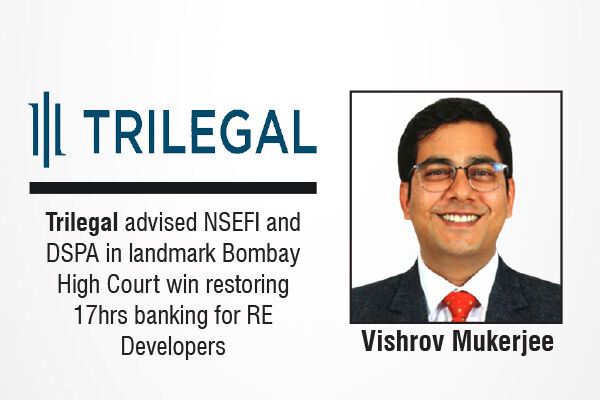
Trilegal advised NSEFI and DSPA in landmark Bombay High Court win restoring 17hrs banking for RE Developers
The leading law firm in India, Trilegal, successfully represented the National Solar Energy Federation of India (NSEFI) and the Distributed Solar Power Association (DSPA) before the Hon’ble Bombay High Court in a batch of writ petitions filed against the Maharashtra Electricity Regulatory Commission (Ld. MERC) and Maharashtra State Electricity Distribution Company Limited (MSEDCL).
The challenge was directed against Ld. MERC’s Review Order dated 25.06.2025, which sought to drastically amend the solar banking framework introduced under the Tariff Order dated 28.03.2025. In particular, Ld. MERC’s Review Order confined the drawal of banked solar energy to ‘solar hours’ (0900 to 1700 hrs) only, rendering the banking facility in Maharashtra largely redundant. Further, Ld. MERC failed to grant an opportunity of hearing to affected stakeholders, including RE developers who had participated in the original proceedings, violating core principles of natural justice.
Bombay High Court Judgment
Vide Judgment dated 03.11.2025, the Bombay High Court allowed the batch of writ petitions, set aside the Review Order, and remanded the matter to Ld. MERC, directing that the Review Petition filed by MSEDCL be decided afresh after providing full stakeholder participation.
Regulatory Principles Reaffirmed
By striking down Ld. MERC’s attempt to modify RE banking without issuing public notice or hearing stakeholders, the High Court reaffirmed that any amendment to tariff determined through a public process must follow the same consultative mechanism. It also clarified that the inherent powers of a Commission cannot be invoked to bypass the Electricity Act, 2003, or extant MERC Regulations.
Legal Representation
The matter was argued by various Senior Advocates and Vishrov Mukerjee.
Matter Significance
This matter sits at the intersection of clean energy transition, regulatory certainty, and constitutional due process. Ld. MERC’s sudden reversal of its own banking regime, without notice or hearing, triggered far-reaching consequences for existing and under-construction renewable energy projects in Maharashtra.
RE developers had planned, financed, and contracted long-term supply based on the previous banking framework. The revised framework threatened termination risk, penalties, and stranding of transmission capacity. Further, the restriction jeopardised the captive status of renewable energy-based Captive Generating Plants (CGPs), triggering potential levy of cross-subsidy and additional surcharges.
Trilegal spearheaded the litigation before the Bombay High Court, successfully safeguarding the settled banking rights, while reinforcing judicial scrutiny over arbitrary regulatory action.
Ruling Significance
The ruling safeguards renewable developers relying on the banking framework for operational flexibility and captive structuring. It averts unintended tariff shocks and mitigates risks of contract termination, open-access disruption, loss of captive eligibility, and investment distress.
The case has attracted national attention, with implications for energy regulators across India contemplating similar banking rollbacks. It also highlighted the growing concern around regulatory overreach and the importance of transparent, consultative governance in the energy sector.
The Trilegal Dispute Resolution Team advising on the matter was led by Vishrov Mukerjee (Partner), and supported by Pratyush Singh (Counsel), Hridhay Khurana (Counsel), Damodar Solanki (Senior Associate), and Garima Adlakha and Arnav Bhansali (Associates).
Click to know more about Trilegal
If you have a news or deal publication or would like to collaborate on content, columns, or article publications, connect with the Legal Era News Network Team and email us at [email protected] or call us on +91 8879634922.